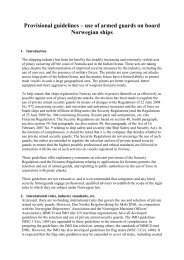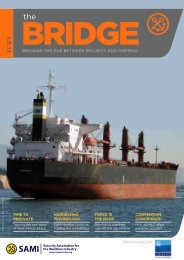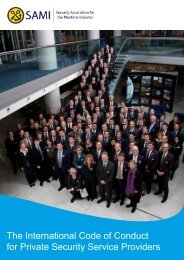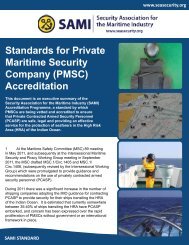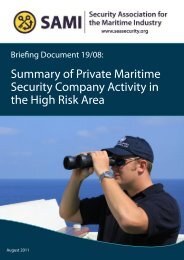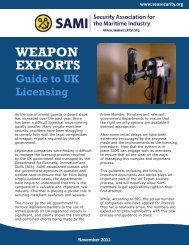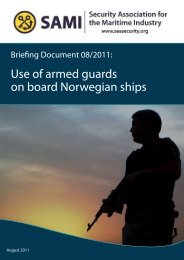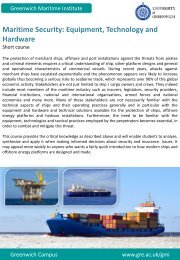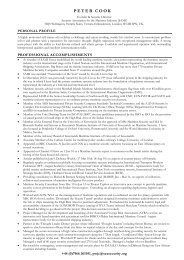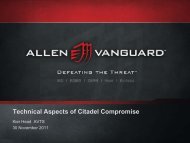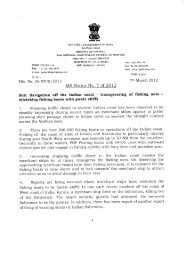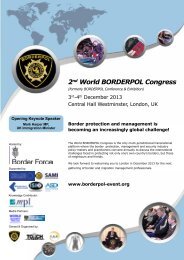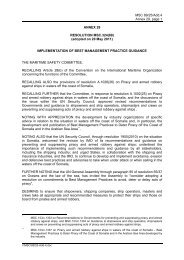Accommodation, recreational facilities, food <strong>and</strong> catering5. Every effort should be given to ensuring that the forwarding of seafarers’mail is as reliable <strong>and</strong> expeditious as possible. Efforts should also be considered foravoiding seafarers being required to pay additional postage when mail has to be readdressedowing to circumstances beyond their control.6. Measures should be considered to ensure, subject to any applicable nationalor international laws or regulations, that whenever possible <strong>and</strong> reasonable seafarersare expeditiously granted permission to have their partners, relatives <strong>and</strong> friends asvisitors on board their ship when in port. Such measures should meet any concerns forsecurity clearances.7. Consideration should be given to the possibility of allowing seafarers to beaccompanied by their partners on occasional voyages where this is practicable <strong>and</strong>reasonable. Such partners should carry adequate insurance cover against accident<strong>and</strong> illness; the shipowners should give every assistance to the seafarer to effect suchinsurance.Guideline B3.1.12 – Prevention of noise <strong>and</strong> vibration1. Accommodation <strong>and</strong> recreational <strong>and</strong> catering facilities should be located asfar as practicable from the engines, steering gear rooms, deck winches, ventilation,heating <strong>and</strong> air-conditioning equipment <strong>and</strong> other noisy machinery <strong>and</strong> apparatus.2. Acoustic insulation or other appropriate sound-absorbing materials shouldbe used in the construction <strong>and</strong> finishing of bulkheads, deckheads <strong>and</strong> decks within thesound-producing spaces as well as self-closing noise-isolating doors for machineryspaces.3. Engine rooms <strong>and</strong> other machinery spaces should be provided, whereverpracticable, with soundproof centralized control rooms for engine-room personnel.Working spaces, such as the machine shop, should be insulated, as far as practicable,from the general engine-room noise <strong>and</strong> measures should be taken to reduce noise inthe operation of machinery.4. The limits for noise levels for working <strong>and</strong> living spaces should be in conformitywith the ILO international guidelines on exposure levels, including those in theILO code of practice entitled Ambient factors in the workplace, 2001, <strong>and</strong>, whereapplicable, the specific protection recommended by the International <strong>Maritime</strong>Organization, <strong>and</strong> with any subsequent amending <strong>and</strong> supplementary instruments foracceptable noise levels on board ships. A copy of the applicable instruments in Englishor the working language of the ship should be carried on board <strong>and</strong> should be accessibleto seafarers.5. No accommodation or recreational or catering facilities should be exposed toexcessive vibration.Regulation 3.2 – Food <strong>and</strong> cateringPurpose: To ensure that seafarers have access to good quality food <strong>and</strong> drinking waterprovided under regulated hygienic conditions1. Each Member shall ensure that ships that fly its flag carry on board <strong>and</strong> servefood <strong>and</strong> drinking water of appropriate quality, nutritional value <strong>and</strong> quantity that51
<strong>Maritime</strong> <strong>Labour</strong> <strong>Convention</strong>, 2006adequately covers the requirements of the ship <strong>and</strong> takes into account the differing cultural<strong>and</strong> religious backgrounds.2. Seafarers on board a ship shall be provided with food free of charge duringthe period of engagement.3. Seafarers employed as ships’ cooks with responsibility for food preparationmust be trained <strong>and</strong> qualified for their position on board ship.St<strong>and</strong>ard A3.2 – Food <strong>and</strong> catering1. Each Member shall adopt laws <strong>and</strong> regulations or other measures to provideminimum st<strong>and</strong>ards for the quantity <strong>and</strong> quality of food <strong>and</strong> drinking water <strong>and</strong> for thecatering st<strong>and</strong>ards that apply to meals provided to seafarers on ships that fly its flag,<strong>and</strong> shall undertake educational activities to promote awareness <strong>and</strong> implementationof the st<strong>and</strong>ards referred to in this paragraph.2. Each Member shall ensure that ships that fly its flag meet the following minimumst<strong>and</strong>ards:(a) food <strong>and</strong> drinking water supplies, having regard to the number of seafarers onboard, their religious requirements <strong>and</strong> cultural practices as they pertain to food,<strong>and</strong> the duration <strong>and</strong> nature of the voyage, shall be suitable in respect of quantity,nutritional value, quality <strong>and</strong> variety;(b) the organization <strong>and</strong> equipment of the catering department shall be such as topermit the provision to the seafarers of adequate, varied <strong>and</strong> nutritious mealsprepared <strong>and</strong> served in hygienic conditions; <strong>and</strong>(c) catering staff shall be properly trained or instructed for their positions.3. Shipowners shall ensure that seafarers who are engaged as ships’ cooks aretrained, qualified <strong>and</strong> found competent for the position in accordance with requirementsset out in the laws <strong>and</strong> regulations of the Member concerned.4. The requirements under paragraph 3 of this St<strong>and</strong>ard shall include a completionof a training course approved or recognized by the competent authority, whichcovers practical cookery, food <strong>and</strong> personal hygiene, food storage, stock control, <strong>and</strong>environmental protection <strong>and</strong> catering health <strong>and</strong> safety.5. On ships operating with a prescribed manning of less than ten which, by virtueof the size of the crew or the trading pattern, may not be required by the competentauthority to carry a fully qualified cook, anyone processing food in the galley shall betrained or instructed in areas including food <strong>and</strong> personal hygiene as well as h<strong>and</strong>ling<strong>and</strong> storage of food on board ship.6. In circumstances of exceptional necessity, the competent authority may issuea dispensation permitting a non-fully qualified cook to serve in a specified ship for aspecified limited period, until the next convenient port of call or for a period not exceedingone month, provided that the person to whom the dispensation is issued istrained or instructed in areas including food <strong>and</strong> personal hygene as well as h<strong>and</strong>ling<strong>and</strong> storage of food on board ship.7. In accordance with the ongoing compliance procedures under Title 5, thecompetent authority shall require that frequent documented inspections be carried outon board ships, by or under the authority of the master, with respect to:52
- Page 8:
C5.1. Flag State responsibilities .
- Page 11 and 12:
the Convention regarding the need f
- Page 13 and 14:
oard ships but are not directly inv
- Page 15 and 16:
supervisory system (a system establ
- Page 18 and 19:
A16. How does the MLC, 2006 make it
- Page 20 and 21:
A19. What will happen to the mariti
- Page 22 and 23:
B. Questions about the workers andt
- Page 27 and 28:
authority?] as qualified to issue s
- Page 29 and 30:
C1.3.b. Does this training requirem
- Page 31 and 32:
It may be useful to also consider t
- Page 33 and 34:
equirements for upgrading or promot
- Page 35 and 36:
C2.3.h. Do the hour of rest and hou
- Page 37 and 38:
C3. Title 3 Accommodation, recreati
- Page 39 and 40:
y berths and lockers, chests of dra
- Page 41 and 42:
C4.1.b. Must every ship have a ship
- Page 43 and 44:
• the cost of safeguarding the pr
- Page 45 and 46:
(b) facilities for sports and outdo
- Page 47 and 48:
• Sickness benefit• Unemploymen
- Page 49 and 50:
agreed upon international standards
- Page 51 and 52:
provisions of Regulation 5.1.3 and
- Page 53 and 54:
C5.1.o. What is the period of valid
- Page 55 and 56:
(b)(c)to carry out any examination,
- Page 57 and 58:
prevents ships being delayed by unn
- Page 59 and 60:
certificate and DMLC should be the
- Page 61 and 62:
C5.2.q. Are complaints confidential
- Page 64 and 65:
INTERNATIONAL LABOUR CONFERENCECont
- Page 66 and 67: Maritime Labour Convention, 2006MAR
- Page 68 and 69: Maritime Labour Convention, 2006(b)
- Page 70 and 71: Maritime Labour Convention, 20062.
- Page 72 and 73: Maritime Labour Convention, 2006Pla
- Page 74: Maritime Labour Convention, 20062.
- Page 78: Explanatory note to the Regulations
- Page 82 and 83: Minimum requirements for seafarers
- Page 84 and 85: Minimum requirements for seafarers
- Page 86 and 87: Minimum requirements for seafarers
- Page 88 and 89: Minimum requirements for seafarers
- Page 90 and 91: Conditions of employmentTITLE 2. CO
- Page 92 and 93: Conditions of employmentGuideline B
- Page 94 and 95: Conditions of employment3. National
- Page 96 and 97: Conditions of employment(a) hours o
- Page 98 and 99: Conditions of employment4. Paragrap
- Page 100 and 101: Conditions of employmentRegulation
- Page 102 and 103: Conditions of employment(b) accommo
- Page 104 and 105: Conditions of employmentciently and
- Page 106 and 107: Accommodation, recreational facilit
- Page 108 and 109: Accommodation, recreational facilit
- Page 110 and 111: Accommodation, recreational facilit
- Page 112 and 113: Accommodation, recreational facilit
- Page 114 and 115: Accommodation, recreational facilit
- Page 118 and 119: Accommodation, recreational facilit
- Page 120 and 121: Health protection, medical care, we
- Page 122 and 123: Health protection, medical care, we
- Page 124 and 125: Health protection, medical care, we
- Page 126 and 127: Health protection, medical care, we
- Page 128 and 129: Health protection, medical care, we
- Page 130 and 131: Health protection, medical care, we
- Page 132 and 133: Health protection, medical care, we
- Page 134 and 135: Health protection, medical care, we
- Page 136 and 137: Health protection, medical care, we
- Page 138 and 139: TITLE 5. COMPLIANCE AND ENFORCEMENT
- Page 140 and 141: Compliance and enforcement(a) has t
- Page 142 and 143: Compliance and enforcement7. Detail
- Page 144 and 145: Compliance and enforcement14. A cer
- Page 146 and 147: Compliance and enforcement5. If a M
- Page 148 and 149: Compliance and enforcement(a) the i
- Page 150 and 151: Compliance and enforcementGuideline
- Page 152 and 153: Compliance and enforcement(c)(d)the
- Page 154 and 155: Compliance and enforcementStandard
- Page 156 and 157: APPENDIX A5-IThe working and living
- Page 158 and 159: Appendix A5-IIThis is to certify:1.
- Page 160 and 161: Appendix A5-IIMaritime Labour Conve
- Page 162 and 163: Appendix A5-IISignature: ..........
- Page 166 and 167:
Appendix A5-IIThis Certificate is v
- Page 168 and 169:
APPENDIX B5-I - EXAMPLE OF A NATION
- Page 170:
Appendix B5-IDeclaration of Maritim



